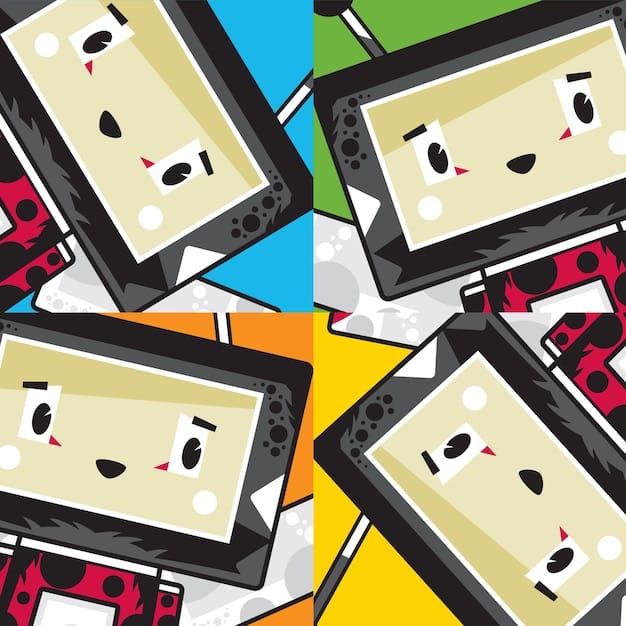Pop Culture’s Mirror: How it Reflects Societal Values

Pop culture, encompassing mass media, entertainment, and trends, serves as a dynamic mirror reflecting and often shaping societal values, beliefs, anxieties, and aspirations, offering profound insights into the collective consciousness of a given era.
Delving into the intricate relationship between entertainment and modern life, this article investigates How Pop Culture Reflects Societal Values: A Critical Analysis, exploring how the trends we consume subtly and overtly mirror the prevailing beliefs, anxieties, and aspirations of an era.
The Symbiotic Dance: Culture, Society, and Reflection
Pop culture is not merely a collection of transient trends or fleeting fads; it is a profound and complex ecosystem that actively interacts with societal values. This interaction is a two-way street: popular entertainment often draws inspiration from real-world events and shifts in public opinion, while simultaneously influencing them. Consider how a groundbreaking film or a chart-topping song can spark nationwide conversations, challenging existing norms or solidifying new ones.
This symbiotic relationship reveals itself in various forms, from the narratives woven into our favorite television shows to the fashion trends that define a decade. It’s a continuous feedback loop where art imitates life, and then, life begins to imitate art. Understanding this dynamic is crucial for dissecting the subconscious messages and overt statements embedded within popular media, allowing us to grasp the nuanced ways our shared realities are portrayed and processed.
Historical Echoes: Cultural Barometers Through Time
Throughout history, popular culture has served as an invaluable barometer of societal change. From Shakespearean plays reflecting Elizabethan anxieties about power and succession, to 19th-century novels grappling with industrialization and class divisions, art has always been a mirror. In the 20th century, the advent of mass media amplified this reflection exponentially.
- 🎥 **Mid-20th Century Films:** Films from the 1950s often depicted traditional family values and cold war anxieties, showcasing a society grappling with post-war prosperity and looming global threats.
- 🎵 **1960s Music:** The music of the 1960s, particularly folk and rock, articulated a counter-cultural movement, questioning authority, advocating for civil rights, and promoting peace amidst war.
- 🎮 **1980s Video Games:** Early video games like “Pac-Man” and “Super Mario Bros.” reflected a burgeoning interest in technology and escapism, mirroring a society increasingly comfortable with digital interfaces and interactive entertainment.
The narratives we consume, the heroes we admire, and the villains we fear all tell us something about who we are, what we value, and what challenges we face. They provide a cultural shorthand, a shared language that allows us to interpret and communicate complex societal shifts.
This historical perspective underscores that while the platforms and formats of pop culture evolve, its fundamental role as a societal mirror remains constant. Each era leaves its cultural fingerprint through its popular art, offering future generations a glimpse into its triumphs, struggles, and defining characteristics.
In essence, pop culture provides a constantly updated historical record, not of grand political events, but of the everyday aspirations and unspoken fears that shape a populace. It’s in the nuances of a sitcom plotline or the lyrics of a protest song that we find the true pulse of a society.
Representation Matters: Identity and Inclusion in Media
The way different groups are represented in popular culture is a critical indicator of societal values regarding diversity, equity, and inclusion. For decades, mainstream media largely reflected a narrow demographic, perpetuating stereotypes and marginalizing certain communities. However, as societies evolve and push for greater recognition of all its members, pop culture has slowly begun to adapt, albeit with varying degrees of success.
The journey towards more authentic and inclusive representation is ongoing. Early portrayals were often tokenistic or caricatured, reinforcing existing biases. Yet, persistent advocacy from marginalized groups and a growing understanding of the importance of diverse perspectives have led to significant shifts in recent years.
Evolving Portrayals of Gender and Sexuality
Gender roles and expressions of sexuality have undergone dramatic transformations in pop culture. From the restrictive portrayals of women in 1950s sitcoms to the multifaceted female protagonists of contemporary cinema, the evolution is palpable. Similarly, discussions around LGBTQ+ representation have moved from complete absence or villainization to more nuanced and positive depictions.
- 🏳️🌈 **LGBTQ+ Visibility:** The increasing visibility and positive portrayal of LGBTQ+ characters in television series and films reflects a growing societal acceptance and understanding, moving beyond stereotypes to present complex human experiences.
- ♀️ **Female Empowerment:** Modern narratives often feature strong, independent female characters challenging traditional norms, indicating a societal embrace of gender equality and female agency.
- ⚧️ **Transgender Narratives:** Recent years have seen groundbreaking transgender characters and stories emerge in mainstream media, contributing to broader public education and empathy.
These shifts are not just artistic choices; they are reflections of real-world debates and movements pushing for equality. When a blockbuster film features a non-binary character or a mainstream TV show portrays a same-sex couple, it normalizes these identities for millions of viewers, often before broader societal acceptance is fully achieved.
Beyond gender and sexuality, racial and ethnic representation has also seen significant evolution. While challenges remain, the increase in protagonists of color, stories from diverse cultural backgrounds, and the dismantling of harmful stereotypes are clear indicators of a society striving for a more equitable narrative landscape.
This progress in representation contributes to a more accurate and comprehensive societal mirror, one that reflects the richness and complexity of human experience rather than a singular, often biased, perspective. It underscores the power of pop culture not just to reflect, but to actively shape and advance societal values towards greater inclusivity.

Anxieties and Aspirations: Mirroring Collective Consciousness
Popular culture often acts as a collective subconscious, externalizing the anxieties and aspirations that simmer beneath the surface of society. From dystopian futures that reflect our fears about technological control to utopian visions that embody our hopes for a better world, these narratives provide a safe space to explore pressing societal issues without directly confronting them in reality. They serve as a vital outlet for processing complex emotions and anticipating potential challenges.
The themes that resonate most strongly in films, literature, and music often directly correlate with prevailing public concerns. Economic recessions might lead to stories of resilience against adversity, while accelerating technological advancements could inspire tales of AI gone rogue or profound human-AI connections. This constant interplay ensures that pop culture remains deeply relevant to the human condition.
Technological Progress and Its Discontents
The rapid pace of technological innovation is a constant source of both excitement and apprehension. Pop culture frequently taps into these feelings, presenting both the promises and perils of new technologies. Whether it’s the utopian dreams of space exploration or the cautionary tales of artificial intelligence, these narratives help us grapple with the implications of progress.
- 🤖 **AI and Robotics:** Films and series exploring benevolent or malevolent AI reflect societal debates about ethical technology, job displacement, and the nature of consciousness.
- 🌐 **Digital Connectivity:** Stories about virtual reality, social media’s impact, and online privacy speak to our evolving relationship with digital spaces and the challenges of hyper-connectivity.
- 🧬 **Biotechnology:** Narratives around genetic engineering and medical advancements often address concerns about ethical boundaries, human enhancement, and the definition of life itself.
These cultural reflections are not merely entertainment; they are a public forum for discussing the profound ethical and social questions raised by our rapid technological evolution. They allow us to collectively consider “what if” scenarios, preparing us for potential futures or prompting us to consider the path we are taking.
Beyond technology, pop culture also processes broader societal anxieties like climate change, political polarization, and global health crises. Conversely, it celebrates collective aspirations for justice, equality, and peace, often through heroic narratives or stories of community building.
The narratives we consume, therefore, become a barometer of our collective state of mind. They show us what we are worried about, what we hope for, and what kind of future we envision, offering a compelling snapshot of a society’s current emotional and intellectual landscape.
Pop Culture as a Catalyst for Social Change
While pop culture undeniably reflects societal values, its influence extends beyond mere mirroring; it can also act as a powerful catalyst for social change. A well-placed narrative, a catchy protest song, or a compelling character can shift public opinion, challenge entrenched norms, and even spark movements. This transformative power lies in its ability to reach vast audiences, present complex ideas in accessible formats, and evoke empathy in ways that traditional discourse often cannot.
The emotional connection fostered by stories and characters allows for a deeper internalization of messages, making pop culture an effective tool for advocacy and awareness. When entertainment confronts uncomfortable truths or champions marginalized voices, it opens dialogue and can precipitate tangible societal shifts. It’s an arena where abstract concepts become relatable human experiences.
Shaping Perceptions and Inspiring Action
From the Civil Rights Movement to LGBTQ+ rights, popular artists and media have played pivotal roles in changing perceptions and inspiring collective action. When iconic figures or beloved stories champion a cause, they lend it legitimacy and reach audiences who might otherwise remain disengaged.
- 🎶 **Protest Music:** Songs by artists like Bob Dylan or Nina Simone became anthems for social justice, mobilizing listeners and articulating collective grievances.
- 🎭 **Advocacy through Storytelling:** Television shows like “All in the Family” or “The Cosby Show” (despite later controversies) initially tackled sensitive topics like racism and family dynamics, sparking national conversations.
- 🦸♂️ **Symbolic Heroes:** Superheroes, often seen as mere escapism, can symbolize ideals of justice, hope, and resilience, inspiring both individual and collective action in the face of adversity.
This catalytic role highlights pop culture’s agency in shaping the future. It’s not just a passive receiver of societal trends; it’s an active contributor to their formation. The discussions initiated by a controversial film or a thought-provoking series can spill over into real-world activism, policy debates, and shifts in cultural norms.
Moreover, pop culture can validate experiences, reduce stigma, and build community among individuals who previously felt isolated. By seeing their lives reflected and celebrated in mainstream media, people can find empowerment and solidarity.
Ultimately, pop culture’s capacity to both reflect and ignite change underscores its profound significance. It is a dynamic force that not only tells us who we are but also inspires us to become who we aspire to be, making it an indispensable element in the continuous evolution of societal values.
The Commercial Imperative: Values Shaped by the Market
While pop culture reflects and influences society, it operates within a largely commercial framework. The entertainment industry, at its core, is a business driven by profit. This commercial imperative often dictates what stories get told, who gets to tell them, and how they are presented, inevitably shaping the values that are amplified or suppressed within popular media.
The pursuit of mass appeal can lead to standardization, where narratives are homogenized to cater to the broadest possible audience, sometimes at the expense of nuance or challenging perspectives. Market research, audience demographics, and advertising revenue all play a significant role in determining creative output. This economic driver means that certain values, those considered universally appealing or marketable, tend to be prominently featured, while others might be deemed too niche or controversial for mainstream consumption.
Catering to Audiences and Maximizing Profit
The desire to attract large audiences and maximize profit significantly influences popular culture. This can lead to a reiteration of tried-and-true formulas and a cautious approach to themes that might alienate segments of the market. The influence of advertisers and sponsors can also subtly shape content, promoting certain lifestyles or consumption patterns.
- 💰 **Franchise Dominance:** The prevalence of sequels, reboots, and cinematic universes reflects a commercial strategy to leverage existing fan bases and minimize risk, often leading to a conservative approach to narrative innovation.
- 📊 **Targeted Demographics:** Content is frequently tailored to specific age groups or consumer segments, reinforcing certain values and aesthetics that appeal to those lucrative markets.
- 📱 **Social Media Metrics:** The drive for engagement and viral content on platforms like TikTok and YouTube can prioritize sensationalism or trending topics over depth and originality.
This commercial lens can also explain why certain social issues gain traction in pop culture while others remain sidelined. If a social movement gains significant mainstream attention, rendering it “safe” or even profitable to depict, then media companies might embrace it. Conversely, issues perceived as too polarizing or commercially unviable may be ignored.
However, it’s also important to note that the commercial imperative isn’t solely a negative force. The need to innovate to stay competitive can sometimes lead to groundbreaking content, and the desire to tap into new markets can open doors for more diverse voices and stories that were previously overlooked. This tension between artistic integrity and commercial viability is a constant negotiation within the industry.
Ultimately, understanding the commercial drivers behind pop culture helps us critically analyze the values it presents. It prompts us to consider whether a trend genuinely reflects a societal shift or if it’s partly a product of market demand, ensuring a more nuanced understanding of this powerful cultural force.

The Digital Revolution: Acceleration and Fragmentation
The advent of the digital revolution has profoundly reshaped the landscape of popular culture, fundamentally altering its reflection of societal values. The proliferation of the internet, social media, and streaming platforms has accelerated the pace at which trends emerge and dissipate, while simultaneously leading to an unprecedented fragmentation of audiences. This new ecosystem presents both opportunities — for diverse voices to be heard — and challenges — in maintaining a shared cultural understanding.
In the past, pop culture was largely dictated by a few major gatekeepers (film studios, record labels, television networks). Now, creator economy models and user-generated content mean anyone can become a cultural producer. This democratization of content creation has led to an explosion of niche communities and subcultures, each with their own values and aesthetics, often diverging sharply from mainstream narratives. This fragmentation means there’s no longer a single, universally shared cultural mirror, but rather a kaleidoscope of individual reflections.
Echo Chambers and Global Reach
The digital age has brought both the immense interconnectedness of global reach and the isolating phenomenon of echo chambers. While content can transcend geographical boundaries almost instantaneously, algorithms often curate feeds to reinforce existing beliefs, potentially limiting exposure to diverse viewpoints.
- 🌍 **Globalized Trends:** Social media allows trends (e.g., TikTok dances, viral memes) to spread globally within hours, showcasing a new era of cross-cultural exchange and appropriation.
- 🔄 **Algorithmic Personalization:** Streaming services and social media tailor content to individual preferences, potentially creating echo chambers where users only encounter views that confirm their own, leading to cultural polarization.
- 🗣️ **Fan Communities:** Online platforms have fostered hyper-engaged fan communities that can critically analyze, reinterpret, and even create their own content, often pushing for greater representation and challenging established narratives.
This dual nature of the digital revolution means that societal values are reflected in more ways than ever before, but also perhaps less uniformly. Different online communities cultivate and express vastly different values, often leading to cultural clashes or a lack of understanding between groups. The rapid feedback loop of digital platforms means that societal reactions to cultural products are immediate and often intense, further shaping subsequent content creation.
The digital revolution forces us to reconsider what “popular” means in a fragmented world. Is it defined by sheer volume of consumption, or by the depth of engagement within niche communities? This shift has profound implications for how we perceive pop culture’s role in reflecting, and indeed shaping, the varied values of a complex, interconnected, yet often divided society.
Future Trajectories: What’s Next for Pop Culture’s Mirror?
As we look to the future, the relationship between pop culture and societal values is poised for further evolution. Emerging technologies like augmented reality (AR) and virtual reality (VR) promise even more immersive and personalized cultural experiences, potentially blurring the lines between creator and consumer. The ongoing global shift of power, economic restructuring, and environmental challenges will undoubtedly find their way into the narratives, aesthetics, and expressions of future popular culture. The mirror will continue to adapt to the changing face of humanity.
The growing emphasis on ethical concerns, such as data privacy, mental health impacts of technology, and sustainable practices, will likely become more prominent themes in popular media. As societies become more globally interdependent, cross-cultural influences will likely intensify, leading to even more blended and diverse cultural products. The mirror will not only reflect individual societies but increasingly, the global human experience.
Interactive Narratives and Personalized Experiences
The trend towards personalization and interactivity, already evident in streaming services and video games, is expected to deepen. This could lead to cultural products that are not just consumed, but actively shaped by the audience, offering highly individualized reflections of values and preferences.
- 🎮 **Experiential Media:** VR and AR applications for storytelling could enable fully immersive experiences, where users actively participate in narratives, potentially exploring ethical dilemmas and social constructs in new ways.
- 🎨 **AI-Assisted Creation:** AI tools could enable more accessibility for creators and consumers to generate and customize content, leading to a proliferation of highly specific cultural expressions that cater to niche values.
- 🤝 **Decentralized Ownership:** Concepts like NFTs and blockchain technology could create new models for cultural ownership and community, challenging traditional media gatekeepers and potentially fostering more direct reflections of community values.
The implications of these future trajectories are profound. As pop culture becomes more personalized, will we lose a sense of collective shared experience? Or will these new forms of engagement lead to deeper, more empathetic understandings of diverse perspectives? The challenge will be to balance personalization with the need for common ground and shared narratives that bind societies together.
Ultimately, pop culture’s role as a societal mirror is not static; it is an ever-evolving reflection of human ingenuity, anxieties, and aspirations. By critically analyzing its shifts and trends, we can gain invaluable insights into the present state of our world and anticipate the values that will shape our collective future.
| Key Aspect | Brief Description |
|---|---|
| 🔄 Societal Mirror | Pop culture actively reflects and shapes societal values, beliefs, and anxieties. |
| 🚀 Catalyst for Change | Beyond reflection, it can inspire social movements and shift public perception. |
| 💲 Commercial Influence | Market forces and profit motives significantly impact cultural output and values perpetuated. |
| 🌐 Digital Impact | The digital age accelerates trends and fragments audiences, creating diverse reflections. |
Frequently Asked Questions About Pop Culture and Societal Values
Pop culture often externalizes societal fears through dystopian narratives, monster movies, or thrillers that tap into collective anxieties about technology, climate change, or political unrest. Conversely, it reflects hopes through superhero sagas, romantic comedies, or feel-good stories that emphasize community, resilience, and optimism for societal progress and human connection.
It’s a dynamic, two-way street. While pop culture certainly mirrors existing values, it can also actively influence them. By introducing new perspectives, normalizing previously marginalized ideas, or prompting public discourse through compelling narratives, pop culture acts as a catalyst, shaping perceptions and driving social change over time, often subtly.
Commercialism plays a significant role. The need for mass appeal and profitability often dictates which values are amplified or downplayed. Content may be tailored to broad demographics, reinforcing safe or widely accepted values, while controversial themes might be avoided. However, market competition can also spur innovation and the inclusion of diverse voices to capture new audiences.
The digital age has fragmented audiences and accelerated trend cycles. With user-generated content and personalized algorithms, pop culture reflections are more diverse but also more specialized. This leads to both more inclusive representation and the risk of echo chambers, affecting the shared cultural narratives and public discourse.
Critically analyzing pop culture helps us understand the underlying messages and biases it may perpetuate. It allows us to distinguish between genuine societal shifts and commercially driven trends. This critical perspective empowers individuals to engage with media more thoughtfully, recognizing its power to both reflect our world and shape our collective futures.
Conclusion
The relationship between pop culture and societal values is an intricate, ever-evolving dance, where each influences the other in profound ways. Pop culture serves not merely as a passive mirror, but as an active participant in shaping the collective consciousness. From reflecting our deepest anxieties and loftiest aspirations to catalyzing significant social change, the entertainment we consume offers invaluable insights into who we are as a society. As technology advances and global connections deepen, the mirror of pop culture will continue to fragment and diversify, providing a kaleidoscopic view of humanity’s ongoing journey. Understanding this dynamic interplay is essential for a nuanced appreciation of both our media and ourselves.





